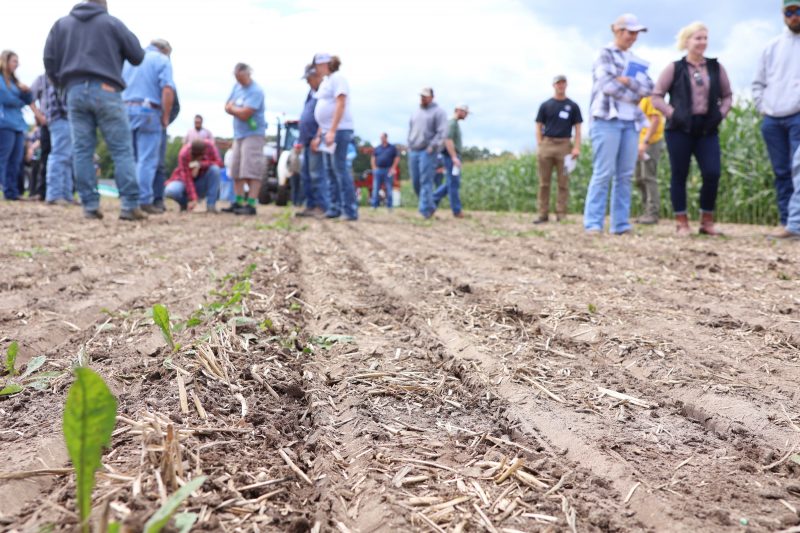Note: This is the 10th installment in the 12-part “A Sense of Where You Are” series.
There’s nothing like getting diminishing returns on your investment in time, labor, and resources to put things in context.
“I just got sick and tired of spending money on fertilizer, planting in the dry powder, and watching the soil blow away,” said Alex Udermann while sitting next to a stack of hay bales on his family’s farm in central Minnesota’s Stearns County. “And we were working until 11 or 12 every night trying to get everything done.”

In 2016, Meadowbrook Dairy, after decades of conventional tillage, began cutting soil disturbance and utilizing cover crop mixes to reduce erosion and build organic matter. The farm consists of an 80-cow dairy and 300 beef steers. It also raises corn, soybeans, alfalfa, and small grains on 1,000 acres. Today, the operation is 100% no-till on its corn and soybean acres, multi-species mixes of cover crops are a regular part of the rotation, and the farm is focused on getting manure applied across fields at rates that are agronomically correct.
When Meadowbrook hosted a Practical Farmers of Iowa field day in August, it was clear these changes were paying off. A slaking demonstration and some impromptu sampling showed that the somewhat sandy soil had good aggregate structure, with signs of activity on the part of earthworms and other beneficial critters.
Udermann is the fifth generation on this farm, which also consists of his wife, Krissy, his brother, Jake, and the brothers’ parents, John and Mary Lou. As Alex explained during the field day, this transition to regenerative practices has helped the farm dramatically reduce its reliance on chemical inputs. Udermann estimates they’ve saved roughly $100 per acre on the cost of putting in a crop, and that accounts for the roughly $55 an acre they spend on cover cropping. A lot of that savings results from fewer tire trips across the fields.
“We now have just the three steps — cover cropping, applying manure, and planting — instead of the eight or 10 we had before,” said the farmer. “It seems like we are working less and getting more done as a family. It’s fun farming again.”
Getting so many payoffs from building soil health doesn’t come without some investments. But in a process that Udermann describes as a “low input transition,” the farmers avoided large outlays of money in the beginning. Rather than sinking big bucks into new equipment, for example, Meadowbrook Dairy invested more in taking a different approach to management and the way they viewed their soil. They did this, for instance, by using their existing field equipment to no-till soybeans. And once those no-tilled beans began to show signs of paying off financially, then the family began putting money into tools such as a no-till planter for corn. At that point, Udermann explains, such purchases are no longer seen as a one-way expense — expenditures graduated to the level of being long-term investments in fortifying a more resilient way of farming.
More investments are in the offing. The last stop on the field day tour was a demonstration of some experimentation Meadowbrook is doing with composting. Julie Reberg, a district conservationist for the NRCS, explained that by breaking down into a biologically rich soil amendment manure and other “waste” materials produced by the farm, the operation can further reduce its reliance on purchased inputs while building the land’s long-term resilience. Udermann has been playing around with low-cost composting by making piles consisting of manure, wood chips, straw, and other materials, and flipping them with his skid steer loader. He’d also like to do more with the kind of compost extracts that are produced via the static Johnson-Su Bioreactor system.
“There’s always more,” a visibly excited Udermann said after the field day. “Once you get bit by the soil bug, it just becomes a snowball rolling down the mountain.”
Brian DeVore edits the Land Stewardship Letter and produces the Ear to the Ground podcast.
Give it a Listen
- Ear to the Ground 358: Low Input-High Returns (Alex Udermann)
- Ear to the Ground 359: Trash to Treasure (Julie Reberg)